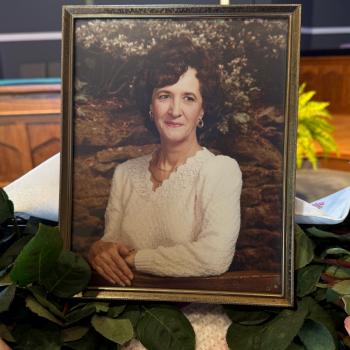At Journey Church, we've had a few weeks of conversation on Romans 12, a chapter filled with lofty and yet simple instructions for Christian living. Verses such as "Let love be genuine," "Live in harmony with one another," and "Do not be overcome by evil but overcome evil with good" are certainly not rocket science to comprehend, but putting them into everyday practice is anything but easy. How do we engage verses that speak so clearly for themselves? For our gathering on Sunday, we took each of the three verses above, chosen as central admonitions to the passage as a whole, and discussed them.
What does it mean for love to be genuine? How can we both recognize it and practice it? Luke Miller said there's something important about the word "Let" in the admonition. It's as if love is genuine, and we simply need to keep it that way, rather than making it into something it isn't. This requires intentionality, because our culture has turned love into commodity, marketing strategy, manipulative technique. There are so many ways "love" doesn't shoot straight from the hip. To let love be genuine, as Luke said, means first rejecting false ways of using or abusing love so that the fullness of love is embodied and made real.
Rob Ramsey put it this way: "I always think about genuine love being deep love. It's love that runs deep. You really can't practice it unless you know someone more than just surface level. You have to get to know the real person with all of their 'junk and baggage' that make them a real person with flaws. Deep love means loving them even when you know all those things and appreciating them as that wonderful and complex person God loves deeply. It's not always easy but when you experience that kind of real love . . . it's worth it."
With all our conversations recently on harmony, the admonition to live in harmony with one another was especially poignant. Earlier in Romans 12, we discussed sharing our gifts and using them together in a way that speaks of the body of Christ. There is a sort of orchestral togetherness that happens when all the instruments are freed to do their part. How do we accomplish that? Ashley Ingels said, "Harmony in music happens when the notes of a chord line up. Sometimes the sound is lovely, bringing joyous and peaceful feelings. Sometimes it is harsh and dissonant, bringing tension and discomfort. At first, in community, it seems to us that other people are the dissonant notes responsible for the tension. Instead maybe we should see ourselves as the dissonant notes. We are the ones who must change to fit the chord." If we are instructed to live peaceably with all, as much as it depends on us (v. 18), it does seem to require action on our part more than finger-pointing at others.
Finally, how do we overcome evil with good? At its heart, it requires us to relinquish control. We cannot take vengeance into our own hands. We cannot, either, demand God to exact punishment in the way we see fit or fair. Leaving room for the wrath of God (v. 19) can sound dicey, but at its heart it means leaving room for God to do whatever God chooses . . . and that can mean giving grace seventy times seven times, despite how unfair it seems to us. Once we let go of our need to serve as law enforcement agents toward those who have harmed us, we can make some room to allow love to be what it is—genuine, patient, not self-seeking, bearing all things, believing all things, hoping all things, enduring all things (1 Cor. 13).
9/7/2011 4:00:00 AM





